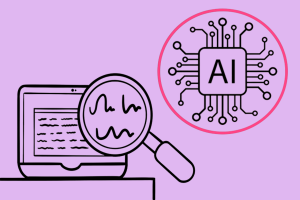
The realm of literature has long been seen as the creative domain of human writers, where words flow from imaginative minds to create stories that capture our hearts and minds. However, the advent of Artificial Intelligence (AI) has given rise to a new player in this literary landscape – the AI book writer.
AI book writers are intelligent algorithms designed to generate written content autonomously, using a vast amount of data as their foundation. These algorithms can analyze patterns, language structures, and themes within existing texts to craft original stories, poems, and even full-fledged novels.
Сan AI replace writers?
AI technology has made significant advancements in generating text and assisting with content creation. However, the creative aspect of writing, the unique style, emotions, and personal experiences that human writers bring to their work is difficult to replicate. So, while AI can generate text using unique words and phrases, it still lacks the depth and nuances that human writers provide.
5 services for writing books using AI
Squibler

Squibler distinguishes itself as a top-tier tool for writing books with the aid of artificial intelligence, combining extensive features with a design that prioritizes user satisfaction. Squibler lends a hand to authors in constructing intricate storylines, showcasing exceptional expertise in crafting vivid scene descriptions. This empowers writers to effortlessly fashion captivating settings, infusing their narratives with a tangible and pulsating essence.
Squibler’s capabilities surpass those of mere AI-aided writing. Its resilient project management tools seamlessly integrate with goal tracking, ensuring that authors always maintain a lucid path in their artistic endeavors.
Simplified

Simplified presents an innovative platform fueled by artificial intelligence (AI) that supports authors in their book creation journey. Through the utilization of cutting-edge natural language processing algorithms, the software effortlessly generates compelling text. Users can share prompts, partial sentences, or even ideas, and witness the AI craft captivating content from such inputs.
Moreover, this remarkable tool seamlessly integrates comprehensive research functionalities by scanning vast databases and online sources. This enables it to furnish users with pertinent information, valuable statistics, and credible references, ultimately enhancing the quality and depth of their work.
Jasper AI

Jasper AI acts as a holistic writing companion that surpasses mere error fixing. It scrutinizes manuscripts to detect instances of passive voice, repetitive vocabulary, and tense discrepancies.
This exceptional program offers instantaneous feedback, facilitating prompt enhancements to the text.
ProWritingAid

ProWritingAid acts as an all-encompassing writing buddy, surpassing the mere task of fixing errors. It thoroughly examines manuscripts, identifying passive voice, redundant vocabulary, and tense irregularities.
With its live recommendations, this software empowers instant enhancements to the text.
Rytr

Rytr is crafted as a stage that welcomes both human wordsmiths and artificial intelligence to collaborate in the art of writing. The program emphasizes its prowess in furnishing preliminary drafts, plot blueprints, and character trajectories. Scribes can input their individual cues and inclinations into the system, guiding the generated content towards a path that harmonizes with their creative vision. Rytr aspires to flexibly adapt to diverse writing styles and genres, rendering it invaluable to those who dabble in various formats or undertake multiple undertakings.
Pros and cons of AI writers
One of the key strengths of AI book writers is their ability to operate at an unparalleled speed. While human writers may take months or even years to complete a single manuscript, an AI book writer can generate a substantial body of work in a matter of days or weeks. This efficiency opens up exciting possibilities for publishing houses and authors, as they can meet demanding publishing schedules and bring more literary creations to readers worldwide.
Despite these advantages, skeptics argue that AI book writers lack the creative spark and nuance that human writers bring to their craft. They claim that this technological intrusion could devalue the art of writing and replace human authors altogether. However, proponents of AI book writing argue that these algorithms can generate unique perspectives, explore unconventional ideas, and push the boundaries of literary expression. They see AI as a powerful tool that complements human creativity rather than eradicating it.

Moreover, AI book writers have the potential to democratize the writing process. Aspiring authors who lack resources or face barriers to traditional publishing can use AI algorithms to refine their skills, explore different genres, and gain exposure. This accessibility allows diverse voices and narratives to emerge, enriching the literary landscape with fresh perspectives.
Ethical considerations
Ethical considerations also arise in the realm of AI book writing. Concerns about intellectual property rights and plagiarism have surfaced, as AI algorithms generate content based on existing texts. Determining the boundaries of originality and ensuring proper attribution becomes a critical challenge. Additionally, biases embedded in training data may be unintentionally replicated, perpetuating inequalities and reinforcing problematic stereotypes in the narratives produced. It is imperative for developers to address these concerns, develop rigorous guidelines, and deploy unbiased training models to mitigate these ethical dilemmas.

In the near future
The collaborative potential between AI and human writers is a promising avenue to explore. Imagine a future where human authors work in tandem with AI algorithms, utilizing their analytical capabilities to streamline the creative process. AI book writers can generate preliminary drafts, identify plot inconsistencies, or suggest innovative narrative structures, while human writers provide the artistic finesse, emotional depth, and that unmistakable human touch readers adore. Together, they can weave tales that transcend what either entity could achieve alone.
Conclusions
In conclusion, the emergence of AI book writers marks a significant advancement in the field of literature. These algorithms offer efficiency, accessibility, and novel perspectives that augment human creativity. However, ethical considerations, artistic integrity, and the collaborative potential between AI and human writers must be carefully navigated to ensure a harmonious coexistence. The future of literature lies in striking a balance between the capabilities of AI book writers and the irreplaceable essence that human authors bring to the literary world.




